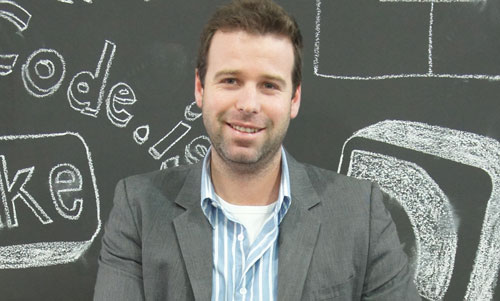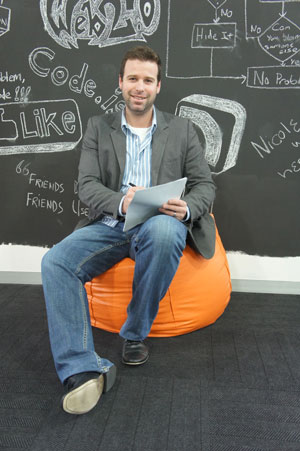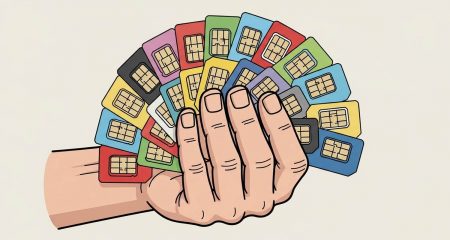
SA start-up Mimiboard wants to be the digital equivalent of a community noticeboard, allowing Africans to access and share locally relevant information from a mobile phone, whether it’s using SMS on a feature phone or a smartphone that can handle proprietary applications.
The brainchild of Johan Nel (30), the CEO of Umuntu Media — a company that produces local content for a dozen African countries — the hope is Mimiboard will get traction by having content to push to the service. Umuntu, which is enjoying success in some of SA’s neighbouring countries, is providing funding for Mimiboard.
Umuntu’s Namibian version is the second most-visited local website in that country and has the biggest Facebook page of any brand in Namibia. It’s also the Facebook leader in Botswana and the third most visited local website.
“We wanted to start in regions with that sort of potential,” says Nel. He says each country is different and requires a different approach. “Kenya, for example, has very strong verticals in place already and large media companies. We can’t just copy and paste the existing portals.”
Nel has a strong media background that goes some way to explaining his enthusiasm for Umuntu and Mimiboard. “I’d worked for Naspers my whole life, ever since I started working,” says Nel. “I always knew there was a huge gap in local content in Africa. I grew up in Namibia, and when I would visit I could never find useful information about Windhoek.”
Nel says his time at Naspers’s Media24 division gave him the knowledge to start Umuntu, but that he had to bide his time until market conditions were right and he had refined the concept sufficiently. “I had to tell my wife I was leaving my comfortable job, selling our home and starting this business.”
Nel used the initial funding to prove the concept and then managed to sell the idea to investors in Holland. “We got seed funding and venture capital from eVentures Africa Fund,” he says. “Once we had been live with the concept for about a year, they made a first-round investment of US$1m.”
That first round closed in September 2011 and allowed Nel to set up an office — a big improvement from a friend’s chilly server room that had been his base.
The funding also allowed Nel to employ seven staff and buy the equipment necessary to run an operation that now operates in a dozen African countries with plans to expand into many more before the end of the year.
Nel says that despite the funding, Umuntu is “still very lean for a company that’s operating in eight markets and taking on some big, established media guys in those markets”. Regardless of what people might think, it’s “not glamourous”.
Most of the Cape Town-based team looks after content and editorial, data management, operations and “day to day news portal things”. Each country in which Umuntu is active also has a sales and marketing person and a local editor who oversees a team of freelancers.
 Mimiboard was developed in part because of the need to evolve digital publishing and avoid becoming “just another news portal”, according to Nel. The portal model has allowed Umuntu to offer property, accommodation and classifieds services in markets that didn’t previously have them, but Mimiboard “allows users to communicate from the ground up with relevant information rather than just being fed it by us”.
Mimiboard was developed in part because of the need to evolve digital publishing and avoid becoming “just another news portal”, according to Nel. The portal model has allowed Umuntu to offer property, accommodation and classifieds services in markets that didn’t previously have them, but Mimiboard “allows users to communicate from the ground up with relevant information rather than just being fed it by us”.
Although digital guide books and similar services add value to consumers, Nel says they “don’t change life in Africa; it’s all still just content”. He says Mimiboard is about creating really useful places for people to interact and share information, and that this is when he entered the application game.
With 6 000 hours of development, Mimiboard — named after the Swahili word “mimi” which means “I” — is similar to a personal pinboard, allowing interaction from other users via SMS, on Nokia handsets that support Java or Android smartphones.
Currently in beta, but expected to launch commercially in as little as a month in SA and sooner in some other regions, Nel says the “strategy isn’t to spend a fortune driving early traffic with mass advertising”. Instead, Mimiboard will be “integrated into our portals and by means of partnering with one big player in each market”.
In Kenya, Umuntu has partnered with that country’s biggest radio station, Capital FM, which has 3,7m monthly unique visitors to its website, 180 000 fans on Facebook and 10m listeners.
“Mimiboard will integrate fully with the station’s daily operations so they can get real info about happenings from the ground up,” Nel says. “There’ll be four Mimiboards, one for community news, one for traffic and road problems, a classifieds board and one to allow listeners to interact with DJs. They’ll be embedded into Capital’s website from start.”
The company is also partnering with Kenya’s Yellowpages service, which will see all 150 000 listings get a “mimiboard”. “Each owner of the listing will be told they have a mimiboard, meaning they can advertise their own listing to others and because that data sits on Mimiboard generally another user in, say, Nairobi looking for that sort of service or product will see it, too”.
Nel sees the service facilitating trade across Africa. “A fisherman can post about his morning’s catch and a trader in the market can reply with an offer per kilogram, all before the catch is even back at the harbour.”
For now, most of Umuntu’s money comes from its news portals in the form of listings fees and traditional online advertising. Mimiboard, meanwhile, will make money via a premium SMS-based credit system of currency that works in the same way as MXit’s Moola.
The company also offers revenue-share models to radio stations or other services that use SMS. When integrating with an existing SMS line, Mimiboard simply takes it over as most stations are reluctant to change their number.
Nel says integration, even with large websites, simply requires copying and pasting code into a site’s backend.
SA is one of the only countries where Umuntu doesn’t have a publishing platform in place because Nel says the market is more mature than others and there are more, larger, deeply entrenched players. Mimiboard, however, will launch in SA within a month. “We think the service is particularly well suited to local radio stations, community stations and regional newspapers”.
Though there is no support for Apple or BlackBerry devices yet, Nel says the company hopes to rectify this soon. However, he says that although BlackBerry is important in SA, he had to “consider costs and the core target market. In most of Africa, that’s Nokia, and Android’s growing fast”. — Craig Wilson, TechCentral
This section on TechCentral focuses on technology start-ups in SA. The purpose is to profile what our start-up entrepreneurs are doing and to highlight some of the interesting technology ideas coming out of SA. Do you have an interesting tech start-up? Are you doing something out of the ordinary? Why not drop TechCentral a line and tell us about what you’re doing?
- Subscribe to our free daily newsletter
- Follow us on Twitter or on Google+ or on Facebook
- Visit our sister website, SportsCentral (still in beta)




